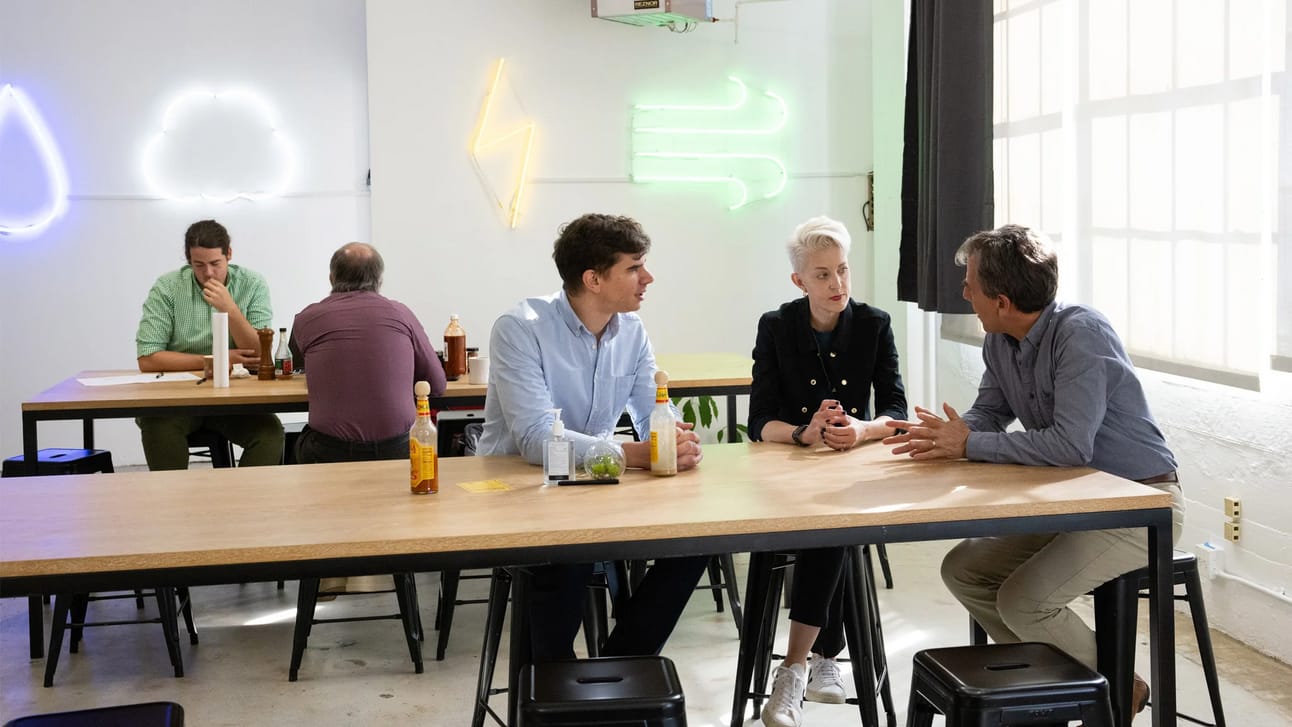- Climate.Online
- Posts
- Trump vs. Climate Tech? Energy Boom Changes the Game
Trump vs. Climate Tech? Energy Boom Changes the Game
The IRA rollback makes U.S. climate startups less attractive to foreign investors.
Welcome to climate.online!
Hey there, climate innovators!
We’re pumped to have you here. climate.online is your new go-to spot for the latest in ESG and climate tech.
The world’s changing fast. Climate challenges are real. Staying informed? More important than ever. That’s why we built this platform—to connect ideas, tech, and people to make a difference.
Meet Gen Matrix
Your guide to GenAI innovation across industries.
Who’s leading the AI revolution? We’ve got you covered.
Organizations pushing the limits of Generative AI.
Startups building the future in AI hardware, infrastructure, and applications.
Leaders shaping the GenAI ecosystem.
Explore. Learn. Stay ahead. Let’s drive change together. Check the full report here.
Trump vs. Climate Tech? Energy Boom Changes the Game

Image Credits: Esade Insights and Knowledge Hub
Just hours after taking office, Trump swung the axe. His first target? Biden’s signature climate law—the Inflation Reduction Act (IRA). With one executive order, IRA loans were frozen. That means everything from EV subsidies to domestic mineral production is now on hold.
But climate VCs? They’re not flinching. Some are even hyped. They’re buzzing about Stargate—a massive $500 billion project backed by OpenAI and SoftBank. The goal? Pump cash into U.S. AI infrastructure. And with AI’s power needs skyrocketing, that’s a golden ticket for startups in grid efficiency and renewables.
Thank you to President Trump for announcing Stargate Project with us today. $500B for AI data centers for OpenAI, built in the US. 🇺🇸
— Greg Brockman (@gdb)
1:11 AM • Jan 22, 2025
“We haven’t seen power demand like this in 50 years,” says Daniel Goldman, managing partner at Clean Energy Ventures. “This is a life-changing opportunity.”
Investors are chasing startups working on domestic energy production, from critical minerals to smarter data centers. Just last month, Crusoe—a company building AI-focused data centers—secured a whopping $600 million round led by Founders Fund.
More money is also flowing into quantum computing and advanced chipmaking. ArcTern Ventures, for example, is doubling down on hardware deals, says managing partner Murray McCaig.
Demand is up, Deals are down.
Climate tech fundraising isn’t what it was last year. PitchBook data shows deals are slowing. But one thing’s different—demand for power is through the roof.
That’s great news for solar, battery, and storage startups. These industries have spent the last decade cutting costs. Now, they’re finally competing with fossil fuels.
“Solar? You can’t ignore it anymore,” says Benjamin Baker from Greenbacker Capital. “When power demand is desperate, you take every option you can.”
Enter ‘American Dynamism’
National security. Onshoring. Rebuilding U.S. industry. These ideas used to be niche. Now, they’re wrapped into a flashy new term—American Dynamism. Andreessen Horowitz coined it, but the entire VC world is catching on.
And that includes climate tech. Expanding the grid and securing domestic energy fit perfectly into this trend.
“Making the grid stronger, producing more energy, and doing it more efficiently—that’s the next big thing,” says Sharo Atmeh, COO of Montauk Climate. “If we have to call it defense tech to get people on board? Cool, let’s do that.”
Investors already know how to play the game. ESG is a dirty word in some places. But that doesn’t mean money stops flowing.
“If you want funding from a Texas retirement fund, you just strip out all the DEI and ESG language from your pitch,” Baker says. “Simple as that.”
The global shift
But there’s one problem. The IRA rollback makes U.S. climate startups less attractive to foreign investors.
Europe’s already looking inward. Government-backed LPs are pushing European firms to invest locally. The result? Europe’s slice of global climate tech investment hit a record 31.9% last year, per PitchBook.
That’s a problem for firms like ArcTern Ventures, which gets most of its money from outside the U.S.
“Right now, 80% of what we do is in the U.S.,” McCaig says. “Will that still be true tomorrow? No clue. But this move makes it a whole lot harder.”
€10M Secured! OCELL Is Taking Climate Data to the Next Level

German climate tech startup OCELL just locked in €10M in Series A funding. Capnamic led the round, with Bayern Kapital joining in. Existing backers AENU, Summiteer, and a few big-name angels—like Max Viessmann—also threw their weight behind it.
What’s OCELL doing with all that cash? Powering up its AI-driven forest tech.
They create hyper-detailed digital twins of forests. Not just satellite scans. It's not just drone shots. Their tech crunches aerial imagery, LiDAR, and ground data to deliver next-level precision. These digital twins track forest growth, carbon storage, and more.
With this new funding, OCELL plans to scale across Europe. The Nordics and Baltics are top priorities. They’re also rolling out a new platform—one that tracks climate projects in real-time with live data. No more guesswork. Just science-backed transparency.
And the impact? Big. OCELL’s software already helps manage over 810,000 hectares of forest. That land could lock away another 1.62 million tons of CO₂e per year.
David Dohmen, OCELL’s co-founder and co-CEO, knows the carbon credit market has taken some hits. Bad data. Bad actors. But he sees OCELL as the fix. “Carbon credits are crucial. But only if done right,” he says. “With AI and nature-based solutions, we’re bringing trust back. Forests are scalable, cost-effective, and—when measured properly—a game-changer for climate action.”
Capnamic’s Christian Knott agrees. What sets OCELL apart? Their deep forestry roots. “They don’t just sell a product. They live the challenges of forest management,” he says. “With new regulations and transparency rules shaking up the market, OCELL is in the perfect spot. They’re not just analyzing forests. They’re helping manage them.”
With fresh funding and big expansion plans, OCELL isn’t just tracking the future of forests—they’re shaping it.
Gradient Taps Climate Tech Veteran Patrick Bischoff as CEO

Image Credits: Gradient
Big changes at Gradient. The company, known for rethinking HVAC with high-performance, sustainable solutions, just named Patrick Bischoff as its new CEO. Bischoff’s got the chops. Two decades of leadership in climate tech, SaaS, and renewable energy. He’s helped scale companies, led IPOs, and closed major acquisitions. Now, he’s stepping in to take Gradient to the next level. Dr. Vince Romanin, Gradient’s co-founder and former CEO, isn’t going far—he’s moving into the Chief Technology Officer role to keep shaping the company’s long-term vision. And Jane Sidebottom, a seasoned industry pro with experience at Carrier and Trane, is joining the board.
Timing couldn’t be better
Gradient’s All-Weather 120V Window Heat Pump just hit a major milestone. The Consortium for Energy Efficiency (CEE) recently set a new category for room heat pumps. Gradient’s model? It landed in the Advanced Tier, the highest level. That’s big.
Why? As of January 1, homeowners using CEE-certified room heat pumps can claim up to $3,200 in IRA tax credits. And more incentive programs are expected to roll out soon. Meaning—big opportunities ahead.
A mission that hits home
"Decarbonizing HVAC while keeping homes comfortable? That’s a mission I can get behind,” Bischoff says. He’s fired up about Gradient’s work, especially its partnership with NYC Housing Authority. It’s real impact, not just theory.
Bischoff’s no stranger to scaling climate tech. Before this, he was COO at Recurve, where he reshaped the business model and locked in funding. He also played a key role at Greensmith Energy Solutions, helping grow revenue from $500K to $30M before the company was acquired by Wärtsilä.
A leader for the next phase
"Patrick knows how to scale. He knows how to build great teams. And he’s laser-focused on sustainability,” says Dr. Romanin. "He’s the right person to lead Gradient’s next chapter."
Bischoff’s background? A mix of engineering and business smarts—studied at University of Stuttgart and later graduated top of his class from Thunderbird School of Global Management. His goal? Push Gradient to challenge the status quo while keeping customers at the center.
And the timing? It couldn’t be more right. The HVAC industry is a $200B market, with massive potential to cut carbon emissions.
Big milestone, big vision
Gradient isn’t just celebrating a new CEO. Their All-Weather 120V Window Heat Pump is officially shipping. Designed for year-round comfort, it handles extreme heat and cold with ease. Plus, it’s sleek and plugs right into a standard 120V outlet—no electrician needed.
It’s a big moment for Gradient. New leadership. New product. And a clear mission: electrify and decarbonize heating and cooling. With Bischoff at the helm, they’re just getting started.
We built climate.online to be your go-to guide in the fast-moving world of ESG and climate tech. Hope you find it useful. Hope it sparks ideas.
Your impact starts here. Big or small, every step counts. And we’re here to back you up—every step of the way.
Got ideas? Wanna collaborate? Looking for sponsorships? Hit us up. Let’s make something happen.